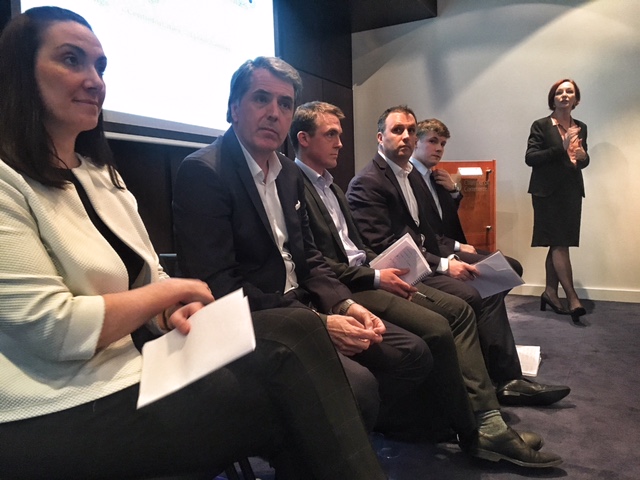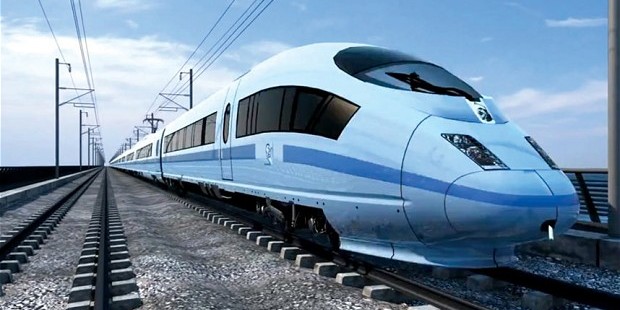Five of the seven candidates spoke before an audience at Liverpool & Sefton Chamber in an event organised by the chamber with think tank Centre for Cities and Professional Liverpool. Tony McDonough reports.

Electing a Liverpool City Region Mayor could be a start of a “revolution” for our local economy, says Liverpool & Sefton Chamber chief executive Jenny Stewart.
Ms Stewart was speaking at a hustings event in Liverpool city centre featuring five of the seven mayoral candidates and organised by the chamber in partnership with think think tank Centre for Cities and Professional Liverpool.
Labour candidate and hot favourite Steve Rotheram was joined on the panel by Tony Caldeira (Conservative), Carl Cashman (Lib Dem), Tabitha Morton (Women’s Equality), and Tom Crone (Green Party).
Also standing but not at the hustings is Paula Walters for UKIP and Roger Bannister for the Trade Unionist and Socialist Coalition (TUSC).
Click to watch the candidates talk more about their campaigns
Despite the potential importance of the newly-created Mayoral role Ms Stewart also pointed out that there was much confusion among the business community and the wider city region population about how the role will be defined and how he or she will work with the existing local authority leaders.
The candidates took the opportunity to explain how they would use the powers of the office were they to be elected in May.
Steve Rotheram:
Mr Rotheram had launched his manifesto earlier in the day where he set out his five key pillars for progress – Ambitious, Fair, Green, Connected and Together.
At the chamber event, he said: “For too long major decisions about our city region have been taken by people too far away and who do not care. This is a once-in-a-lifetime chance to change that situation.
“I grew up in Kirkby, started my working life as an apprentice bricklayer and have run my own business. I believe the centralised political system has been letting people in our city region down for far too long.”
He talked about the imbalance between transport infrastructure spending in the North and the South East pointing out that for every £1 spent on rail infrastructure in the North, London and the South East receives £6.
“London has Crossrail and what we need is Crossrail for the North,” he added.
Tony Caldeira:
Also emphasising his local pedigree, the successful textiles entrepreneur said that he “went to school in St Helens, I run a business in Knowsley and live in Liverpool”.
“I want to build a city region that works for everyone, said Mr Caldeira as he laid out his key strategy of faster growth, improving the skill-base, building more homes and better transport.
He said his business experience coupled with his strong connections with Government ministers made him the ideal candidate for the role.
And, despite being a Conservative, he pledged to work with and build strong relationships with the six Labour-dominated local authorities in the city region and be “bridge to Government”.
He also vowed to block greenfield development except in “exceptional circumstances” and said he would set up a register of brownfield sites and would insist developers would have to look at those first.
“We can build 25,000 new homes in the city region and in the city centre we need to build up to take up less space,” he added.

Carl Cashman:
Mr Cashman was keen to play up the international potential of the Liverpool city region and said the biggest issue facing businesses here was the potential loss of access to the single market due to Brexit.
He pledged to reach out to the Greater Manchester Mayor and establish an embassy for the region in Brussels to ensure the link with Europe aren’t broken.
“Merseyside is the place where I grew up and is the place where I live and of where I am very proud,” said Mr Cashman.
“I will be a Mayor who is pro-internationalist. I believe the city region should be a player on the world stage – I want us to be big, bold and ready for business.”
Like Mr Rotheram, Mr Cashman believes one of the biggest issues facing the city region is lack of good transport connectivity.
He told how a friend travelled from Southport to Prescot to help him with his campaign.
“It took him longer to make that journey that it would have done for him to fly from Liverpool to Spain,” he said.
Tabitha Morton:
Ms Morton told the audience she had been born and brought upon on a council estate in Netherton and, despite limited access to formal education, has since forged a successful career with a global manufacturer.
She says the experiences and the barriers she faced as a young woman have made her passionate about creating equal opportunities for young people across Merseyside.
Said Ms Morton: “For too long women have been left on the sidelines and too many decisions are being made by groups of white men behind closed doors.
“If we settle for a devolution deal that shuts people out then we will not have a city region that grows. Today, women across out city region are facing the same limited options.”
She said the continuing gender pay gap was “appalling” and said training should not just focus on young people but on the disproportionate number of women on zero hours contracts in low-skill jobs.
This, she added, is why investment in transport infrastructure was so important as it was women who depended on public transport more than any other group.
And she said: “Equality is not the top of anyone’s agenda. Liverpool has the highest rates of domestic violence against women in the country and I urge my colleagues on this panel to pledge to end violence against women.”
Tom Crone:
Mr Crone admitted he was the only one on the panel who was not born in Merseyside but added that he had came here to study at university, had since made it his home and and started a family here.
He said that, if elected he would use his position to further the cause of an “ecologically-sustainable society” and a “cleaner, greener, safer Liverpool city region” with an emphasis on renewable energy and waste reduction.
“I offer radically different vision from the other parties – I don’t believe we should pursue growth at any cost,” he explained.
He said a move towards energy efficiency in homes offered an excellent training opportunity for young people.

On transport and connectivity he spoke out against the billions of pounds that it would cost to build the HS2 and HS3 rail networks.
“I am very suspicious of the economic case put forward for high-speed rail and I think we could spend that money altogether differently,” he added.
“We could use it to make lots of smaller improvements to local bus and train stations and make it easier for people to get around.”
The Liverpool City Region Mayoral election take place on Thursday, May 4.
